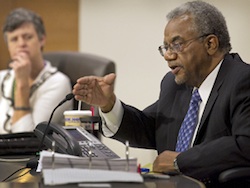Of all the monikers for an elected official to strive to be known as, “the abstainer” is not one of them.
That’s how Travis County Commissioner Ron Davis is known, and as a Sept. 8 American-Statesman story explained, on 26 votes cast in the 2014 budget sessions, Davis racked up a staggering 19 abstentions, four “no” votes, one “yes” vote and two absences. Setting the county’s budget is one of the most important functions of the Commissioners Court, so his failure to decide 19 of 26 times should not be overlooked.
Perhaps Davis would have benefitted from my class with former U.S. Representative Barbara Jordan.
In 1979, she retired from politics at age 43 as one of the most revered politicians in modern history. So, when it was announced she would teach at the Lyndon Baines Johnson School of Public Affairs, she and the school were inundated with requests to audit her classes.
She knew it would take an auditorium to accommodate auditors, but that was not her idea of meaningful teaching. She wanted her graduate seminars in policy development and ethics to be intimate with no more than 10 students. No auditors.
I will try to rectify that by inviting you to return with me into the spring semester of 1992, into the last policy development course the professor taught before her untimely death at age 59 four years later.
Jordan graduated from law school before she served in the Texas Senate and the Congress, so she knew firsthand what courts of law and legislative bodies have in common: both are set up on an adversarial system. Because of that, to teach us what making policy was all about, she gave us a syllabus with seven subjects representing democratic principles.
To thoroughly absorb each in a two-week period, our voluminous assigned readings included articles written by the most respected experts on both sides of the principle. During the two weeks, we would thoroughly dissect the topic. You had better be prepared for class because she would call on you. (I imagine law school is like that.)
The point was to study the issue, then take a stand and defend it. Serving the public interest was our guiding star in deciding. At the end of a two-week period, one by one she would call on us to state and defend our stand. There was no right or wrong stand.
Well into the semester, one classmate confidently declared, “I have thoroughly vetted both sides, and I am afraid I cannot take a stand on this one. Both sides make sense to me.” My classmates and I broke out into an involuntary sweat, and with hearts pounding, eyes widened and jaws dropped, we stared in disbelief at the student who would not take a stand. Professor Jordan furrowed her brow.

U.S. Representative Barbara Jordan opens the impeachment hearings on July 25, 1974. Her brow remained unfurrowed during the electrifying eight-minute and 45-second speech.
For context, never to that point had any of us seen Professor Jordan furrow her brow. And recall, gentle reader, than not once did her brow furrow during the electrifying eight minutes and 45 seconds on July 25, 1974, when she united a nation in turmoil with her speech opening the U.S. House Judiciary Committee’s impeachment proceedings. We all know how that turned out for Richard Nixon.
[To view that speech, click here.]
“Not taking a stand?” she asked with furrowed brow with her voice that rang from the mountaintop, yet was impartial and gentle. “You have read the pros and cons. If you are developing policy or making, applying or interpreting law, then it is your job to take a stand. Riding the fence is not acceptable.”
Barbara Jordan studied all arguments for and against voting rights, civil rights and the articles of impeachment. She took a stand on each issue, defended it and changed the course of American history.
If elected officials frequently abstain, they are not governing. They are not making policy. They are not leading. They are not doing what the people sent them there to do.


 Austin, Texas
Austin, Texas